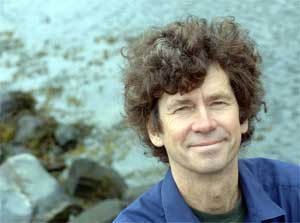 |
| Lesley Choyce idealizes the Nova Scotia way of life in his novel The Republic of Nothing. (Abriel photo) |
If only there was an island where we could create our own utopia Ã. a timeless, mystical place. We could declare it to be a republic and tell the world to keep its grimy little hands off!
ThatÃs the premise behind English professor Lesley ChoyceÃs novel, The Republic of Nothing (Goose Lane Editions). The book has become a Canadian classic, made popular largely by word of mouth among lovers of fiction. Published a decade ago, the novel has just been republished in a 10th anniversary edition.
ÃIt has sold continuously since it was published,â says Mr. Choyce, adding that it has become part of the high school curriculum in a number of provinces, including Nova Scotia and British Columbia.
Winner of the Dartmouth Book Award in 1995, The Republic of Nothing was the first selection of hfxBookTalk, the Halifax Daily NewsÃs new online book club. Its fans include Neil Peart, drummer and lyricist for the rock band Rush, who likes the book so much he penned the afterword to the anniversary edition.
|
AÂ coming-of-age story, the novel is set on the Eastern Shore of Nova Scotia and is full of quirky characters and odd happenings. A small island, Whalebone, declares its independence and tries to keep the outside world with its problems and strife at bay. The bookÃs central character, Ian McQuade, is born in 1951 on the island and grows up through the tumultuous times of the Vietnam War, the peace movement and the hippie era. Unfortunately, the island does not remain immune to outside forces and the story revolves around IanÃs journey to adulthood during this turbulent time.
Mr. Choyce deliberately set the story on an island, idealizing a way of life in Nova Scotia. It reflects the place that he found when he left the United States in the 1970s for Canada and made his home at Lawrencetown Beach.
ÃIt was a place where people were not yet jaded or corrupted,â he says, and the novel was an attempt to hang on to those ideals. So he created an island where its inhabitants were actively trying to either escape the big outside world or guard their way of life against it.
The novel has a sweetness that makes it appealing to all ages.Â
ÃI put everything into it à all in one package. It is not a Ã60s novel and it bridges the 1960 and the 1970s. I tried to give it the timeliness of something that happens on an island. What if you could keep the world out?â
But, of course, that ideal cannot stand up to intrusions and Ian learns that he must find his way. He's grounded by the solid values that are part of his heritage and background.
Mr. Choyce has since written a screenplay of the novel, which has been optioned by the film production company that made the 1995 film MargaretÃs Museum. Stay tuned.The Republic of Nothing may soon be coming to a movie theatre near you.

